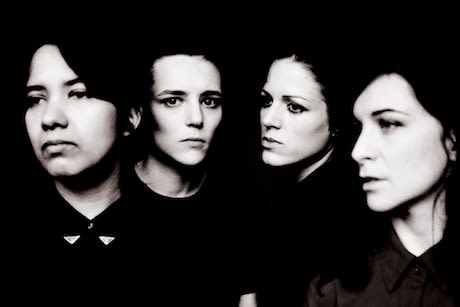Potentially," begins Jehnny Beth, sucking Coca-Cola through a straw in a hotel lobby, "people who come to see us play will receive a sound, they will receive a word, and something will happen."
This is how Savages' lead singer talks: every action played for reaction, no gesture empty. "They will go home and maybe they will look at their husbands differently, look at their family differently, friends, lovers, their job, what kind of music they listen to. Because nothing else is asking you to think about these things! Where are the things that make you reflect?"
Right here, as it happens. Savages assembled in 2011 and, inspired by noisemakers as disparate as Wire and Black Sabbath, began honing a furiously sharp post-punk that explores sexuality, pornography and psychosocial oppression. Notable among the line-up was uprooted française Jehnny Beth, a trained jazz pianist of intellectual parentage. "When I was ten," she recalls, "my mum read me Proust at bedtime." This is somehow unsurprising.
Beth's background in art house film manifests as indomitable stage presence ― think John Lydon's soul being rent forth from Ian Curtis's body. Naturally UK press immediately latched on; word of mouth spread like a dirty rumour, prompting sceptics to blame a largely nonexistent PR campaign.
Indeed, 18 months and a Matador deal since their first column inches, Savages have sacked managers ("they were pushing us to sign early..."), released singles on Jehnny Beth's Pop Noire imprint ("...so I started my own label!") and crafted Silence Yourself, Britain's finest debut of 2013. And still their vision prevails: "Pop music is such a direct thing," Beth says, gazing into her black beverage. "It's a great power, a great tool, a great medium. We're artists, so we should explore what it is to be a human."
This is how Savages' lead singer talks: every action played for reaction, no gesture empty. "They will go home and maybe they will look at their husbands differently, look at their family differently, friends, lovers, their job, what kind of music they listen to. Because nothing else is asking you to think about these things! Where are the things that make you reflect?"
Right here, as it happens. Savages assembled in 2011 and, inspired by noisemakers as disparate as Wire and Black Sabbath, began honing a furiously sharp post-punk that explores sexuality, pornography and psychosocial oppression. Notable among the line-up was uprooted française Jehnny Beth, a trained jazz pianist of intellectual parentage. "When I was ten," she recalls, "my mum read me Proust at bedtime." This is somehow unsurprising.
Beth's background in art house film manifests as indomitable stage presence ― think John Lydon's soul being rent forth from Ian Curtis's body. Naturally UK press immediately latched on; word of mouth spread like a dirty rumour, prompting sceptics to blame a largely nonexistent PR campaign.
Indeed, 18 months and a Matador deal since their first column inches, Savages have sacked managers ("they were pushing us to sign early..."), released singles on Jehnny Beth's Pop Noire imprint ("...so I started my own label!") and crafted Silence Yourself, Britain's finest debut of 2013. And still their vision prevails: "Pop music is such a direct thing," Beth says, gazing into her black beverage. "It's a great power, a great tool, a great medium. We're artists, so we should explore what it is to be a human."
